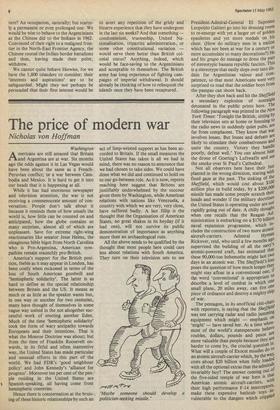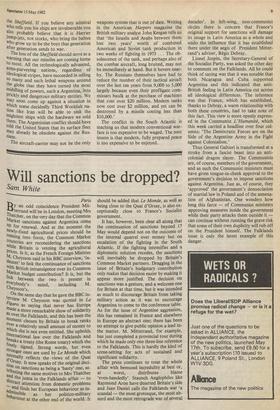The price of modern war
Nicholas von Hoffman
Washington Americans are still amazed that Britain and Argentina are at war. Six months ago the odds against it in Las Vegas would have been about the same as a French- Peruvian conflict; or a war between Cam- bodia and Mexico. It is hard to get it into our heads that it is happening at all.
While it has had enormous newspaper and television attention, the war is not receiving a commensurate amount of con- versation. People don't talk about it because it reminds them of how unsafe the world is, how little can be counted on and anticipated, how the globe contains so many surprises, almost all of which are unpleasant. Save for extreme right-wing reactionaries like senator Jesse Helms, the oleaginous bible bigot from North Carolina who is Pro-Argentina, American sym- pathies remain staunchly pro-British.
America's support for the British posi- tion, feeble as it may appear in London, has been costly when reckoned in terms of the loss of South American goodwill and 'hemispheric solidarity'. The latter is as hard to define as the special relationship between Britain and the US. It means as much or as little as the speaker wants but, in one way or another for two centuries, many have thought of themselves in some vague way united in the not altogether suc- cessful work of erecting another Eden. Much of the time 'hemispheric solidarity' took the form of wary antipathy towards Europeans and their intentions. That is what the Monroe Doctrine was about; but from the time of Franklin Roosevelt on- wards, in its fitful and often inattentive way, the United States has made particular and unusual efforts in this part of the world. We had FDR's 'good neighbour policy' and John Kennedy's 'alliance for progress'. Moreover ten per cent of the peo- ' ple residing in the United States are t Spanish-speaking, all having come from hemispheric countries.
Hence there is consternation at the bruis-1 ing of these historic relationships by such an act of limp-wristed support as has been ac- corded to Britain. If the small measures the United States has taken is all we had in mind, there was no reason to announce that we had chosen to take sides. We could have done what we did and continued to hold on to our go-between role. As it is now, reports reaching here suggest that Britons are justifiably underwhelmed by the succour given them by Washington, while American relations with nations like Venezuela, a country with which we are very, very dose, have suffered badly. A last fillip is the thought that the Organisation of American States, no great shakes in its heyday (if it had one), will not survive its public demonstration of importance as anything more than an archaeological ruin.
All the above needs to be qualified by the thought that most people here could care less about relations with South America. They turn on their television sets to see 'Maybe someone should develop a politician-seeking missile.' President-Admiral-General El Supremo Leopoldo Galtieri go into his dressing room to re-emerge with yet a larger set of golden epaulettes and yet more medals on his chest. (How do military men in a nation which has not been at war for a century or
more accumulate so many decorations?) He and his grupo do manage to dress the part
of stereotypic banana republic fascists. This is a stereotype that easily slops over into dis- dain for Argentinian valour and com- petence, so that most Americans were very surprised to read that the soldier boys from the pampas can shoot back.
After they shot back and hit the She/flea a secondary explosion of nostalgia detonated in the public prints here. The following paragraph was printed in the New York Times: 'Tonight the British, sitting by their television sets at home or listening to the radio news in suddenly quiet pubs, are far from complacent. They know that war involves losses. But losses and defeats are likely to stimulate their combativeness and unite the country. Victory they handle poorly, defeat well.' You can almost hear the drone of Goering's Luftwaffe and see the smoke over St Paul's Cathedral. Not all observers here have their feet planted in the wrong direction, staring with fixed gaze at the past. The sinking of the Sheffield, which would cost about $100 million plus to build today, by a $200,000 missile has made some people scratch their heads and wonder if the military doctrines the United States is operating under are °°„.t„ rapidly going out of date. A chilly thought when one recalls that the Reagan Ad- ministration is embarking on a $170 billion naval expansion programme, which in- eludes the construction of two more atomic aircraft-carriers. Admiral HYruall Rickover, retd, who until a few months ago supervised the building of all the navy's atomic-powered craft, has estimated that these 90,000-ton behemoths might last two days in an atomic war. The Sheffield's loss poses the question of how much longer they might stay afloat in a conventional one, If the word 'conventional' is appropriate to describe a level of combat in which one small plane, 20 miles away, can fire one piece of ordnance and destroy a mighty sh1P of war.
The pentagon, in its unofficial chit-chats, with reporters, is saying that the Sheffield was not carrying radar and radio jamming equipment which might — emphasis on 'might' — have saved her. At a time when' most of the world's statespersons belle" roubles, dollars, pounds and pesos are more valuable than people because they are . harder to come by, the crucial question is: What will a couple of Exocet missiles do to an atomic aircraft-carrier which, by the way' costs about $20 billion when fully loaded with all the optional extras that the admirals invariably buy? The answer coming out of the five-sided temple of war here is that American atomic aircraft-carriers, with their high performance F-14 interceptors, make these expensive bathtub toys - in vulnerable to the dangers which criPPleu the Sheffield. If you believe any admiral who tells you his ships are invulnerable you also probably believe that it is Harrier jump-jets, not storks, who bring the babies who grow up to be the boys that generation after generation sends to war.
The loss of the Sheffield should serve as a warning that our missiles are coming home to roost. All the technologically advanced, arms-purveying nations, regardless. of ideological stripes, have succeeded in selling so many and such lethal weapons around the globe that they have turned the most middling of powers, such a Argentina, into prickly and dangerous military entities. We may soon come up against a situation in which some decidedly Third Worldish na- tion like Iran will be able to sink the mightiest ships with the hardware we sold them. The Argentinian conflict should have told the United States that its surface fleet may already be obsolete against the Rus- sians.
The aircraft-carrier may not be the only weapons system that is out of date. Writing in the American Harpers magazine the British military analyst John Keegan tells us that 'the Israelis and Arabs between them lost two years' worth of combined American and Soviet tank production in two weeks of fighting in 1973 . .. The ob- solescence of the tank, and perhaps also of the combat aircraft, long bruited, may not be immediately at hand. But it hovers near- by. The Russians themselves have had to reduce the number of their tactical aircaft over the last ten years from 9,000 to 5,000 largely because even their profligate com- missars baulk at the purchase of machines that cost over $20 million. Modern tanks now cost over $2 million, and yet can be destroyed by a missile costing less than $10,000.'
The conflict in the South Atlantic is teaching us that modern conventional war- fare is too expensive to be waged. The next lesson is that modern, fully prepared peace is too expensive to be enjoyed.







































 Previous page
Previous page